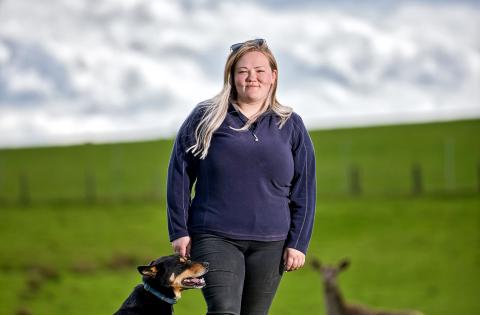Young farmer Rebecca Williams is a business partner at her family’s 400 acre upland farm where she has worked for the last five years. The family keep 24 Welsh Black cattle, 700 sheep and 84 red deer. This year, Rebecca is sending her first group of deer fawns to a major retailer. Involved in both the Farmers Weekly Apprentice scheme and the Tesco Future Farmer Foundation, she has an appetite for learning, and plans to utilise her exchange visit to learn all she can about marketing and adding value to red meat.
“Efficiency and profitability are two key drivers for me, so I want to learn from farmers who successfully process and market their produce directly to consumers.”
EXECUTIVE SUMMARY
Opportunities for Welsh farmers from predicted growth in red meat sales
With sales of red meat predicted to grow by £34 billion in the next five years compared to just £5 billion for plant-based products, research by a young Welsh farmer points to the potential for considerable growth in this sector in Wales.
Becca Williams, who farms cattle, sheep and deer with her parents near Llandrindod Wells, researched opportunities for marketing meat directly with support from the Farming Connect Management Exchange programme.
“We can take some confidence that meat is here to stay in a big way,’’ she concluded.
Although vegetarian and vegan diets will have an influence on the market, Becca concluded from her study that meat will always be a part of a balanced diet.
Her research brought her into contact with many industry experts, including Professor David Hughes, Emeritus Professor of Food Marketing at Imperial College London and Visiting Professor at the Royal Agricultural University.
“When asked if the diets of vegans and vegetarians would have a large impact on the market Professors Hughes said how he would be surprised if the ‘meat substitute’ market would grow more than 10% of the whole market over the next 20 years,’’ she said.
“But as the UK population isn’t expected to grow greatly in that time, export markets will be hugely beneficial. Globally the world would like to eat more meat, so much so that within five years the meat market is predicted to grow by £34 billion when compared to only £5 billion for a plant-based market, we can take some confidence that meat is here to stay in a big way.’’
To capitalise on this, producers should aim to shorten the supply chain if possible. “Use the fact that the public has greater trust in farmers than the rest of the supply chain,’’ said Becca.
Educating the public should also form a greater part of marketing, she added. “We have a great story to sell.’’
But, as an industry, Professor Hughes suggests that farmers should be more mindful of how their finished product is named.
“To take chicken as an example, probably the best-selling product would be chicken ‘nuggets’, which ‘sounds’ very family friendly, they don’t wish to be reminded they are eating a ‘shoulder’, a ‘rib’ or a ‘leg’,’’ Becca said.
“Using alliteration and memorable product names to possibly rename cuts could be more consumer friendly than using the names of animal body parts.’’
MANAGEMENT EXCHANGE REPORT


